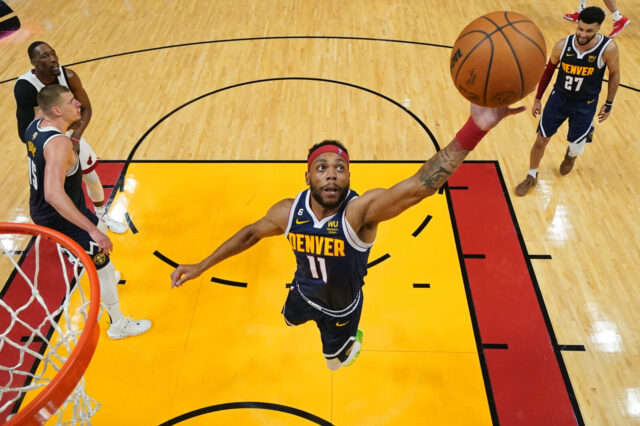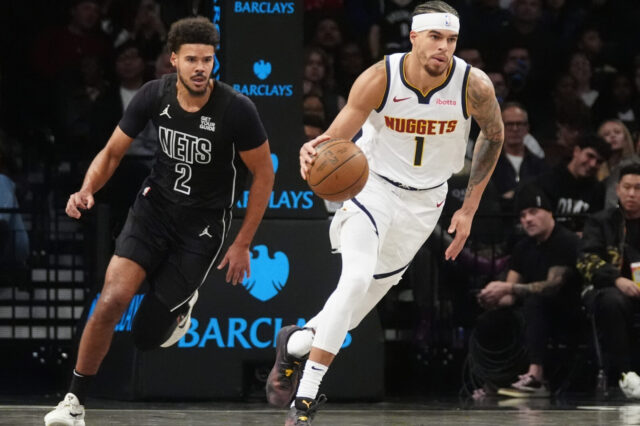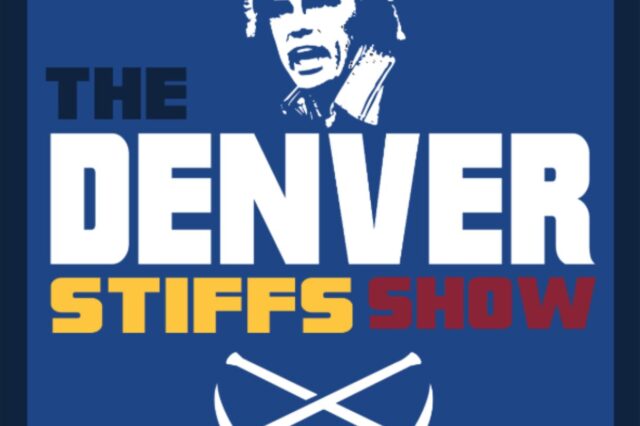Teamwork aphorisms abound on coasters, posters and Pinterest boards everywhere, but there’s one in particular worth talking about with this particular Nuggets team: It’s not about the pieces, but how they work together.
Fit is an under-rated component in team creation. In football you have to draft the correct pieces for your schemes. Zone-blocking linemen can get destroyed in a man-blocking scheme, while great 3-4 defensive tackle might not work at all in a different 4-3 scheme. The same goes for baseball, which is as much a one-on-one contest as it is a team endeavor. Some teams build slugging lineups while others rely on speed and defense. Flyball pitchers with hulking monstrosities in the outfield might not fare as well.
"Play to your strengths" is more team-oriented coach-speak for being aware of what you're good at, but it also requires teammates to know what others are good at. Basketball requires immense amounts of teamwork on almost every possession. “Spacing” is a concise way to say, “running around making sure that someone else can score more easily.” Is there a lot of glory in staking out the corner 3? If you’re Ray Allen, then yes, but most of the time the answer is no. The right teammates, the right placement, and the right understanding and acceptance of a role can lift a mostly-thankless job as a roleplayer into the limelight however – especially if the stars of the team are aware of this.
LeBron James once said about his responsibilities in passing the ball:
"It's my responsibility to know how my guys want the ball. If they like it with no seams or with the seams. I know that might not make sense — some guys like it different ways. I get the ball right in my hand before I throw it. I know the guys on my team like seams or guys who like the ball high when they catch it. I know guys who like it low or midsection. I know where everyone wants the ball, and I just try to put it there on time and on target. All they have to do is catch and fire. It's those guys working on their craft that allows me to do that."
That requires buy-in from the players getting the ball, however. They have to know what they are expected to do, what to look for, and how to execute when they are given the opportunity. They have to resist the temptation to do more in order to perfectly execute doing less. Our own Adam Mares has talked before on his podcast about player-fit being as important as player-talent-level. A third-tier talent who perfectly fits his role may perform better than a second-tier talent who tries to do too much. A man’s got to know his limitations.
The word ego has come up a lot already in Denver’s training camp, with several players and coaches gushing over Paul Millsap’s lack of it. Some of the greats had towering egos, but self-awareness is crucial in building a team if there is no all-time talent. The Nuggets aren’t yet sure what budding star Nikola Jokic’s ceiling is, but surrounding him with players who are willing to sacrifice individual glory for team glory is one way to find out quickly what the unique Serbian is capable of.
Head coach Michael Malone said yesterday after practice about the backup power forward role:
"We have so many guys that could fill that backup spot. We could go small with a Wilson or a Juancho. You can play big and have Nikola and Mason out there together. The battle between Kenneth Faried and Trey Lyles is a great one to watch, two completely different players. It's not just the one person, it's the fit on the floor with the players around them. Kenneth has been great and I'll be honest [so has) watching Trey and Mason and how they complement each other so well. It's a great problem to have…"
Players who complement each other’s strengths and hide one another’s weaknesses is crucial to the success of this or any team. Franchises have engaged in another round of talent-swapping this year, with Jimmy Butler going to the Minnesota Timberwolves and Kyrie Irving moving to be the lead dog in Boston and get out from the long shadow of LeBron James – for better or worse.
But one of the most interesting set of moves belongs to the Oklahoma City Thunder, who paired both Paul George and Carmelo Anthony with Russell Westbrook. On a team with that many stars, one player normally has to adjust to doing less. With the recent Miami Heat championship teams that was Chris Bosh. With Cleveland it was Kevin Love. Melo, resplendent in his summer hoodie, laughed at the idea that it would be him in that position with the Thunder:
Melo is not a bench player, because he is not a “lesser” player – at least not in his mind. Can Oklahoma City mesh all of those talented players as starters? Thunder fans hope so. If it was best for the team for Melo to come off the bench, would he? Seems not. Jusuf Nurkic wouldn’t, at least not willingly. He believed he was a starter, and he was right – he just wasn't the best starter for this Nuggets team considering the other pieces in place (or not in place). The ability to subsume one’s individual ego to reach team goals is a crucial component of most championship squads, though – almost any team loaded enough to win a title has at least one bench player who would be a starter somewhere else. It’s convincing them to fully embrace an alternate role that makes the difference.
Kenneth Faried's interview about being a starter got him in the news this week. Faried is a competitor and has every right to want to start. In the interview he fairly assessed that Millsap's play as an All-Star earns him that right instead, but the Manimal obviously views starting as a referendum on him as a player. As a player who has never averaged 30 minutes a game for a season, and who has increasingly had back issues that force him to play through pain, a bench role might keep him fresh for the year and let him dominate lesser players. It just isn’t a role he wants.
Contrast that with Will Barton. Will also wants to start, but is getting quality minutes off the bench and making the most of them, even when he is forced into a de facto point guard role. He’s making the most of his current situation and getting Sixth Man of the Year votes in the process.
I wouldn't tell Faried to stay in his lane, to appropriate a Lavar Ball-ism. Faried wants to start and feels like not starting is a mark of disrespect. I will say that finding players who enthusiastically embrace their roles with a team is important. There are 15 full-time roster spots and only 5 starting positions. The majority of any team are bench players. Denver had issues last year as changing roles upset some and lack of starting time angered others. Players like defined roles; expectations are important boundaries to set. The other half of that equation, though, is that those expectations have to be embraced.
As Doc Rivers once said, “Not everyone can be the star, but you can be a star in your role.” Gary Harris and Juancho Hernangomez are two players that excelled for the Nuggets in their appointed roles last year, and the Nuggets will need far more of that this year. Malone has already talked about wanting a nine-man rotation. That means everyone will have a responsibility in their respective lineups, and will need to work together to get the job done.
The goal for Denver’s players this year: bloom where you're planted. Whether it’s the G League, the bench or the starting lineup, embracing a role to its fullest helps individual goals as well as team goals – and a team loaded with willing bloomers can definitely maximize its talent. Here’s hoping we see Denver maximize its current talent this year, because to make their mark in the playoffs in a loaded Western Conference they may have to.


